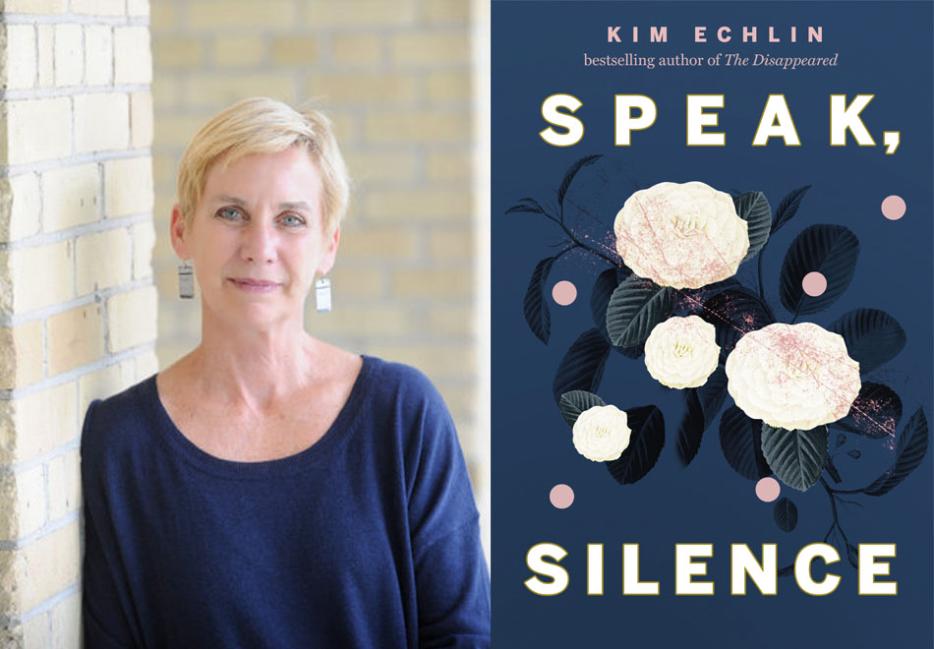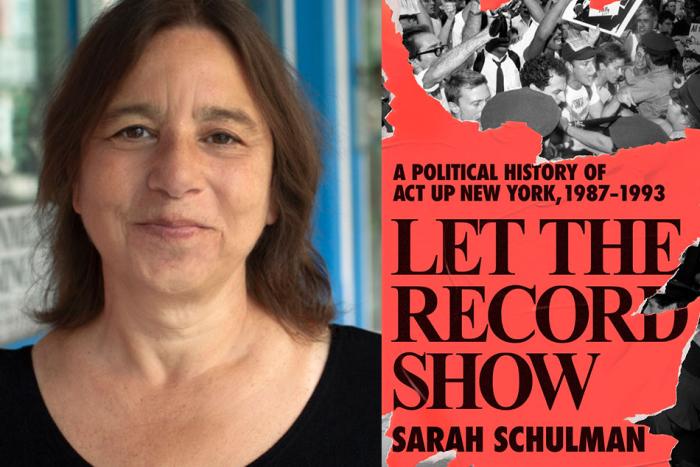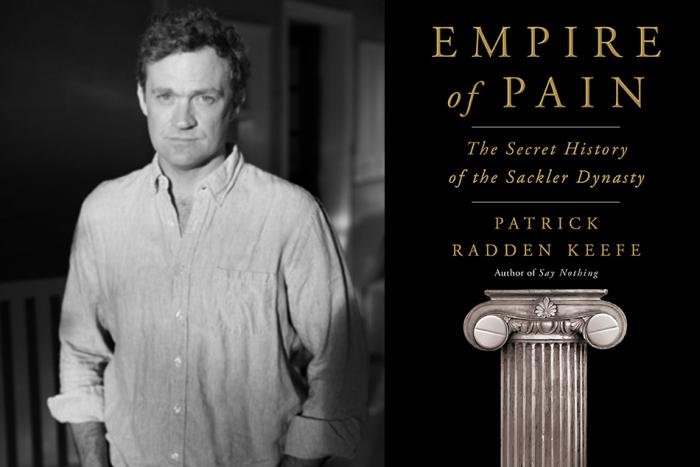Kim Echlin’s fifth novel, Speak, Silence (Hamish Hamilton) explores what war does to women, and seeks out the stories that exist, decades later, behind the frontlines: in homes, courtrooms, and offices. At the turn of the millennium, Gota, a Canadian travel journalist and single mother, accepts a job to write about the annual Sarajevo Film Festival. It’s a welcome opportunity to pursue some light travel writing and reconnect with her long-time love interest Kosmos. Soon enough, though, Gota’s trip turns into something much more significant: uncovering the fallout of the Bosnian and Yugoslav wars, which took place between 1992 and 1995, and witnessing a landmark international tribunal on war crimes against women at The Hague.
Inspired by—and containing material from—the Foča case at The Hague, the novel blends unchanged courtroom testimonials from women who survived war crimes with a fictional account of life as an outsider in early 2000s Bosnia. After Gota arrives in southeastern Europe from Canada, she finds herself in a love triangle with Kosmos and Edina, who runs a documentation center to record the statements of women who survived the war. Edina also happens to be Kosmos’s true love, but she eventually makes friends with Gota when she becomes the subject of an essay Gota is writing on the tribunal.
The trial at The Hague, which happened in 2000, lasted nine months, and the mandate by the International Criminal Tribunal for the former Yugoslavia (ICTY) lasted from 1993 to 2017. Judges were appointed from 52 nations and 900 people from around the world worked in the courts. An international team of lawyers and researchers also travelled around the world to find women—refugees of the war—who found the courage to revisit those memories and testify in court.
By drafting statutes, listing crimes, and then persecuting those crimes, legislative change began to take shape. Although rape had long been considered a violation of human rights, it hadn’t yet been criminalized or considered a crime against humanity. These trials helped set a new precedent. The women—survivors whose lives changed historically, politically, and socially—were burdened with an inter-generational legacy of physical and emotional trauma. By being given the opportunity to voice their experiences in court and on the record, those responsible for crimes committed were held accountable.
Speak, Silence has been a decade in the making, involving travel, consulting with women who had lived experience of the war crimes, and reading thousands of pages of testimonies from the trials. “To be able to write about these war crimes means having an awareness of that line between research and the truth that's already on the record,” Echlin tells me, speaking from her home in Toronto about the process of separating experience from knowledge when writing about war. “But it’s also about the empathy needed in order to enter into the imaginative space when you're creating a novel.”
Echlin and I also spoke about how long it takes for change to happen, having visceral proof of your culture being erased, and who gets to be remembered as heroic.
Nathania Gilson: What was your research process for this book?
Kim Echlin: The research for a book like this is intense. I’ve been working on it for 10 years. In the early days of the research, it was focused on finding out about the International Criminal Court (ICC). There were a lot of Canadians involved in these courts as interpreters and case managers. And I am of a generation that watched this war on television. I had a small child when this war was being broadcast, too. So I had a long association with the region. When the trial started, I became fascinated with what was happening because this was absolutely groundbreaking jurisprudence. For the first time in human history, according to the law, war could not legally be fought on a woman's body.
And when I understood the magnitude of the shift of consciousness around this, I thought, I really want to write about this. So I visited The Hague. I saw the places where the trials took place and talked to prosecutors and case managers there. And a very transformative moment for me was a visit to Sarajevo and Bosnia.
I traveled with a former soldier who had also been a former UN driver and was now running a tourism group focused on war tourism. His company was called Funky Sarajevo Tours: Breaking Prejudice. This man had lost his own brother in the war. He had survived the war, gotten his family through the war, driven for UN researchers, and was now continuing to be a kind of living memory of the war for backpackers who were coming through. He's a marvelous man.
And then the other person who came on that trip with me was a case manager from The Hague. He met me there and traveled with us. We went to see the places that are mentioned in the novel; Karaman’s house [a torture campsite near Foča] was one of them.
I also had the opportunity to visit The Association of Women Victims of War—the NGO that works on prosecuting perpetrators in Bosnia and gives information to international courts. I met with its founder, Bakira Hasecic, there. That visit helped me learn about how the research was done in terms of gathering the women's stories that were then selected for the court case in The Hague.
What was it like speaking with the women who’d lived through this period of time?
I was very conscious of my responsibility as a witness in not being part of any form of retraumatizing or exploitation of the women’s stories. I only worked with Bakira, who herself was a war survivor. I got the rest of the stories from the trial transcripts. There were 2,000 pages of transcripts for this trial. These women had already told their stories and told them in some detail. I didn’t feel it would be worthwhile to ask them to repeat what they had already put on the record.
Through the process of writing this book, how did your understanding of the legal system change?
The Foča trial was in the year 2000. The primary shift of consciousness embraced by that trial is that sexual assault and war is now legally classified as a crime against humanity. A crime against humanity is now also part of the legal definition of genocide. By starting to put those things together, you get a different pressure on war to respect the rules of war: what's acceptable, what's not acceptable. This seems contradictory but it's actually part of our international legal system.
If we're to look at the fact that sexual assault and war is now a constitutive part of genocide and a crime against humanity when we look at what is happening among the Rohingya people, or China's northwest Xinjiang region, where women are being systematically sexually assaulted in order to perpetrate this genocide against Muslims in the region, and in a number of African countries, too, what we see is that while we have the law in the books, we are still not enforcing that law. There’s two important things to remember: we have the law on the books, and we can think about enforcing it globally. Twenty years is a long time to wait for change to happen, but it's not 2,000 years.
I’m thinking of people who might be too intimidated to engage with the subject of war crimes in fiction.
Just as many of us have read The Iliad. We read it as a work of art but we also read it as something that describes war and how people felt about war at that time. In contemporary writing we can strive to do that as well—we can strive to recreate war in an imaginative space. This isn't epic poetry but the novel can help people better imagine what we're actually trying to think about.
There are lots of poets, writers, and thinkers you quote in this novel. One of them is Virginia Woolf, toward the end of the book: “The public and private worlds are inseparably connected. . . .the tyrannies and servilities of one are the tyrannies and servilities of the other.” How did you decide whose voices to channel to bring the ideas in this book to life?
Virginia Woolf is just a perennial favorite of mine! But that quote is so central to the thought change in this book because what it does is it brings this book into our own households. If we haven’t experienced war firsthand, we have definitely experienced tyranny and servility in our own homes, and in our communities. That allows us to imagine what it would be like in the public sphere. It allows me to connect with you, it allows me to connect with a Bosnian woman, it allows me to connect with a weaver from Northeast China. It gives us the point of reference where we have all experienced this core condition that allows bullying, war, or the different kinds of degradation that happen among humans if they’re not conscious.
There are lots of vignettes going back to the main character Gota’s childhood. Lots of scenes retelling fictionalized family history. I wonder: why was it important for you to keep the small details of everyday life in the book?
Gota, when she reaches back through the generations, understands that in her own family she comes from a woman who was sexually assaulted and who dies during childbirth. It's an experience that we can't say is over there or far away. If we look carefully at our own stories, we're likely to see that there are shared points of reference.
Also, in the court cases, it's important for the prosecutors to look at the expression of genocide through three generations of women. In a genocide, what you're doing is destroying past memories, the present, and the possibility of a future. That’s why in the court case, they constructed it around three women in the same family to have some visceral proof of the attackers trying to wipe out their culture, not just individual women.
In Gota’s own story, she has a long and unexpressed history of war and how women [in her family] have lived and coped with war in their own lives, even though she hasn't had it in her generation. Her parents both experienced the second World War. The idea was to ask the reader to consider that war is not so far away from any of our lives. If we peel off some of the layers in our own stories, we're bound to find it in our lives.
What was your interest in having travel or movement be such a big part of the story?
I think that the contemporary world is very interconnected. And there are many people in the world now who identify with many places in the world. Gota is able to travel quite easily for education, or just to go to Paris to live for a few years to get away from home and so on. But the other side of international travel is actually international displacement, such as Bosnian women who are forcibly displaced. The thing that connects them both, is that wherever these women go, the notion of home that they have is carried inside them. It's not a geographical place.
Gota, she carries her feeling of home inside while she's out witnessing the world. Edina, the Bosnian woman in the book, goes home. She’s very courageous, but her mother and daughter can never go home again. They decide to live in Vienna. That's actually the true story of most of the women who testified: they've set up in different parts of the world.
And the city where I live, Toronto, is a city where 50 per cent of our population speaks a language other than English or French at home. So when we step outside our door, we can—if we're open—hear stories from all over the world. Many of these are people who have been forcibly displaced. In a contemporary setting, the idea of a story taking place across many places has become quite familiar to us.
You were trying to reflect the world we actually live in.
The other thing is the very idea of the International Criminal Court, where you have legal representatives from around the world. Over 123 countries were represented. The trials themselves are international. They reflected an international consciousness that was fairly new. They had to write laws specifically for these courts so that everybody had the same rules and procedures. And they're very careful that judges come from all of the participating countries, and that prosecutors and defense lawyers come from different parts of the world so that this is truly an international reflection: what can we agree as a human species that we want the law to be?
What do you think are some of the stereotypes of being a war reporter? How does Gota rise above this or challenge the public perception of journalism, in the novel?
Gota’s not really working as a journalist before she starts covering the court case. She's not really covering a war—she's covering a court case—because she has a child to look after. So the question is: how does a single woman who has a baby, keep working?
She has a relationship with the wonderful Jaques Payac, her editor at the magazine where she works. He’s an amputee from his time as a war journalist. And he understands that she can't do the kind of journalism that would require her to be on the ground for long periods of time because she's a mother. So, he gives her this to do instead. It's light travel journalism.
But then she has this alter ego, Joe de Pone, when she's writing the serious pieces about what she really sees when she's on these trips. Pone means penance and Jaques Payac has given her this name for her serious work that invokes the idea of doing penance: if you're going to go and witness the world, you also need to do penance because you're watching from the outside and you're not subject to it.
She is deeply aware of this. When she goes to cover the trial, she's doing it from the point of view of a Torontonian or Canadian or Westerner who is watching a trial that affects her in the sense that it's about crimes against women, but she's also doing it from the point of view of her friend, Edina. It’s not so much reporting on the trial as it is writing the story of the trial from this double optic of a crime against her gender and a friend who's been victimized by this crime.
So there's more at stake.
Gota’s connectedness to the story is defined by the fact that she's writing it as an essay. She has no aspiration to be objective. She wants to tell the story of this trial as she sees it with the consciousness of her friend woven into it. When I worked as a journalist for a national public broadcaster, the guiding principle was that you aim for a form of objectivity knowing that it is impossible because we all come from our own biases.
Have any stories in the book been based on historical events that have been off the record?
All of the court details are on the record. The novel is a fictionalized version of these transcripts which I read very closely. So there’s no manipulation of voice or changing of voice in these court transcripts at all. They're very, very close to the original. In fact, anyone can go online and look up [the] “Kunarac Trial transcript.” You'll then find the transcripts that I based my own court transcripts on. I was highly conscious of not wanting to change either anyone’s testimony or the legal process that happened. Even the forms of argument that happen in my novel are the exact forms of argument that took place during the trial. Anyone can verify that.
There’s this really great line in the book. One of the counsellors says it to reassure a woman who’s scared to testify: “A person must be loyal to who they are, no matter what happens.” I’m not sure if it’s from a transcript or fictionalized, but I loved that line. It took me back to the smallness and everydayness of living with the consequences of war.
One of the things I worked on during the writing of this book was taking The Iliad as a classical model of an overstory. A woman tells war differently. And she tells more through the details of daily life, and through her preoccupation with her children and her relationships. It's not that it's not the view of war that comes from generals.
I noticed that in the book, too: seeing the documenting of war, or war crimes, as a job. But then also realizing that at the same time people who are living with the aftermath of these experiences still have things, or people, that they care about. The meals they cook. The music they listen to. Things that keep them going.
And how you portray a woman who survives as heroic because we don't traditionally think of these women as heroic. The women themselves have insisted that they not be called victims. They wanted to be called survivors. And then I wanted to show them as heroic, not only in their ability to survive but in their ability to be strong enough to tell this story, which is so full of shame.
In The Iliad, we don't consider it shameful when Hector’s corpse gets dragged through the dust and is disemboweled. It’s so graphic: there are descriptions of blood spilling out and broken bowels. This is considered heroic poetry.
These women said, our bodies are as worthy as any soldier. And we have the courage to tell exactly what happened to us. Which is what happens in the court case. I only used small fragments of it in the novel, but throughout 2,000 pages of documentation and testimony in the court case, those women described precisely what happened to their bodies. This is heroic. And this is breaking all the prejudices and boundaries of shame. This is them saying, we deserve for our story to be told and put on the record.
I think a lot of what holds people back from speaking up is whether that behaviour, or their response to it, would be considered acceptable. Should it have happened in the first place?
That is a huge part of the courage and the testimony of these women. Because [with] a lot of these women, their families rejected them after their experiences. Their families didn’t want anything to do with them because of the shame. These women were even willing to risk being rejected or not being believed. Some of them never were able to go home to [their] families after this.
How did those women rebuild their lives?
Many of them lost most of their family. They couldn't go home because there was no home to go [to]. The war had burned the farms. It’s hard to start over in the same place, psychologically, when so much has been lost. So, instead, people decided to start new lives to the best of their abilities.
This happens here in my own city, Toronto, where people come and begin new lives out of difficult beginnings. Often, it’s to benefit the next generation.






